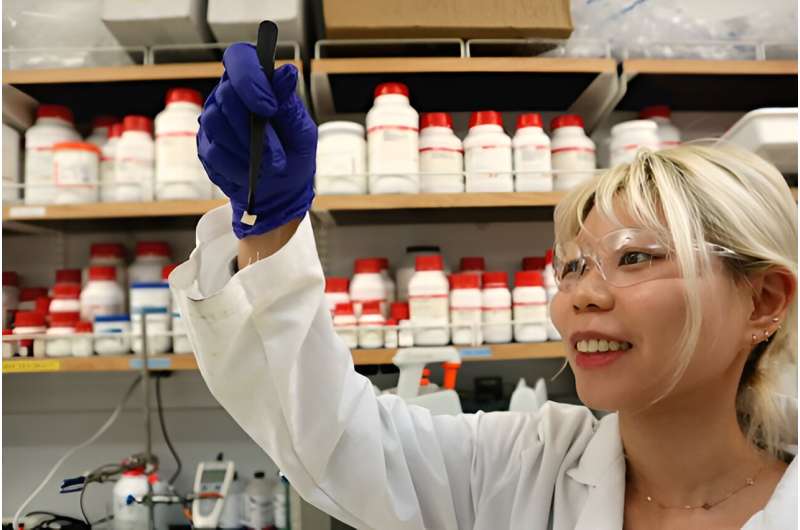This article has been reviewed according to Science X's editorial process and policies. Editors have highlighted the following attributes while ensuring the content's credibility:
fact-checked
peer-reviewed publication
trusted source
proofread
Engineering customizable bio-adhesives for personalized medical repair

Traditional medical adhesives used in surgical applications often have limited bio-absorbability, high toxicity and a lack of customizability, leading to suboptimal surgical outcomes. Recent advances in synthetic biology offer a promising alternative—tailored biocompatible and biodegradable adhesives designed for specific internal biomedical applications, such as in tissue repair and for surgical glues.
Researchers working with Fuzhong Zhang, professor of energy, environmental & chemical engineering in the McKelvey School of Engineering at Washington University in St. Louis, are tackling this challenge with a new class of hydrogels constructed entirely from proteins.
Zhang's collaborators include Marcus Foston, associate professor of energy, environmental & chemical engineering; Guy Genin, the Harold and Kathleen Faught Professor of Mechanical Engineering; and Mohamed A. Zayed, associate professor of surgery and radiology. Their programmable design allows precise control over mechanical and adhesive properties, addressing the limitations of synthetic bio-glues. The research was published in ACS Applied Materials & Interfaces.
"This work is one of the first to prove that synthetic biology can be used not only to produce materials but also to understand material sequence-structure-function relationships," said Juya Jeon, a graduate student in Zhang's lab and first author of the study.
"Our hydrogels are made of artificially designed proteins that have never been created before. These unique proteins give our hydrogels a combination of advantageous properties, including outstanding mechanical and underwater adhesive properties while being bio-absorbable and uniquely fitted to tissue repair/engineering applications."
The team's new material builds on previous studies from Zhang's lab on underwater adhesives inspired by aquatic mussels and their sticky mussel foot proteins (Mfp). Jeon improved on the earlier work by carefully combining silk-amyloid peptides and Mfp into a silk-amyloid-mussel foot protein (SAM) hydrogel.
Acting as a kind of molecular chef, Jeon adjusted the proportions of the two main ingredients to achieve SAM hydrogels that can be finely tuned to display unique combinations of biocompatibility, bio-absorbability, strength, stretchability and underwater adhesion to biological surfaces.
Jeon also explored the intricate relationships between protein sequence and hydrogel properties, which will be crucial to design SAM hydrogels with tailored characteristics for personalized medical repair applications. By fabricating SAM hydrogels using varying combinations of silk-amyloid and Mfps, Jeon and Zhang successfully revealed complex relationships between material structure and properties.
They found that an increase in silk-amyloid repeats significantly enhanced cohesive strength and toughness, while extending Mfp length increased surface adhesion but decreased overall strength. One variant of particular interest demonstrated exceptional strength, strain resistance and underwater adhesivity when tested on a preclinical model.
"The sequence-structure-property relationships uncovered in this study provide invaluable insights to guide the future design of protein adhesives with tunable properties, paving the way for customized adhesives tailored to specific applications," Zhang said.
"This study marks a significant leap forward in the pursuit of safer, more effective surgical adhesives, opening doors to a new era of personalized bio-glues for diverse medical needs. It also illustrates how synthetic biology can be used to illuminate complex molecular relationships and manufacture advanced biomaterials."
More information: Juya Jeon et al, Genetically Engineered Protein-Based Bioadhesives with Programmable Material Properties, ACS Applied Materials & Interfaces (2023). DOI: 10.1021/acsami.3c12919
Journal information: ACS Applied Materials and Interfaces
Provided by Washington University in St. Louis





















